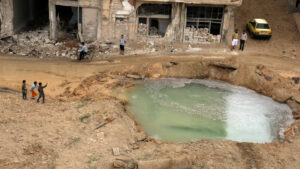On the fateful morning of August 21, 2013, the world witnessed a horrifying event that sent shockwaves through international communities – the Ghouta chemical massacre. This tragic incident marked a gruesome turning point in the ongoing Syrian War, shedding light on the use of chemical weapons against civilians and provoking global condemnation. The attack, which targeted the cities of Zamalka, Ain Tarma, and Muadamiyat al-Sham, resulted in an immense loss of life and forever changed the discourse surrounding the Syrian crisis.
The Syrian regime, under the leadership of Bashar al-Assad, used a series of surface-to-surface missiles loaded with sarin gas to attack the aforementioned cities in Eastern and Western Ghouta. The attack, which occurred just three days after the arrival of United Nations inspectors to Damascus to investigate an earlier chemical attack in Khan al-Assal, left a devastating impact. According to the Syrian Network for Human Rights, the assault led to the tragic deaths of 1,510 individuals due to the inhalation of toxic gases, while a staggering 9,757 people were injured.
In the wake of the Ghouta massacre, the international community was left grappling with the enormity of the tragedy. The United Nations Monitoring, Verification and Inspection Commission (UNMOVIC) played a pivotal role in investigating the incident and determined that sarin gas had been employed through surface-to-surface missiles. The timing of the attack, as noted in the UNMOVIC report, seemed calculated to maximize casualties, further underscoring the brutality of the act. However, the report refrained from explicitly naming the perpetrator responsible for this heinous act.
The lack of attribution in the UNMOVIC report did not quell the international outcry that followed. On September 27, 2013, the UN Security Council issued Resolution No. 2118, condemning the use of chemical weapons. Although the resolution did not explicitly assign blame, it was a clear denouncement of the use of such weapons on innocent civilians.
Amidst the mounting pressure and global outrage, a diplomatic effort emerged. A US-Russian agreement paved the way for the Syrian regime to be admitted to the Organization for the Prohibition of Chemical Weapons (OPCW) on September 14, 2013. This step was taken to avert a potential military intervention in Syria and to circumvent the so-called “red line” drawn by then-President Barack Obama. As part of this agreement, Syria committed to destroying its chemical stockpiles under OPCW supervision, ultimately resulting in the destruction of 1,300 tons of these stockpiles.
However, the tragedy of Ghouta did not mark the end of chemical weapons use in Syria. Disturbingly, the regime continued to deploy such weapons against civilians over two hundred times after the massacre. Subsequent investigations unveiled these repeated violations, which led to Syria’s OPCW membership being suspended on April 21, 2021. Despite initial efforts to bring the regime into compliance, the persistence of chemical attacks against civilian populations ultimately forced the international community’s hand.
In conclusion, the Ghouta chemical massacre stands as a haunting testament to the horrors of warfare and the callous disregard for civilian lives. This tragic event shook the world’s conscience, serving as a stark reminder of the urgent need for global cooperation and accountability to prevent such atrocities. As efforts continue to resolve the Syrian War and promote justice, the memory of Ghouta serves as a somber reminder of the consequences of unchecked brutality and the ongoing struggle for a more peaceful world.


